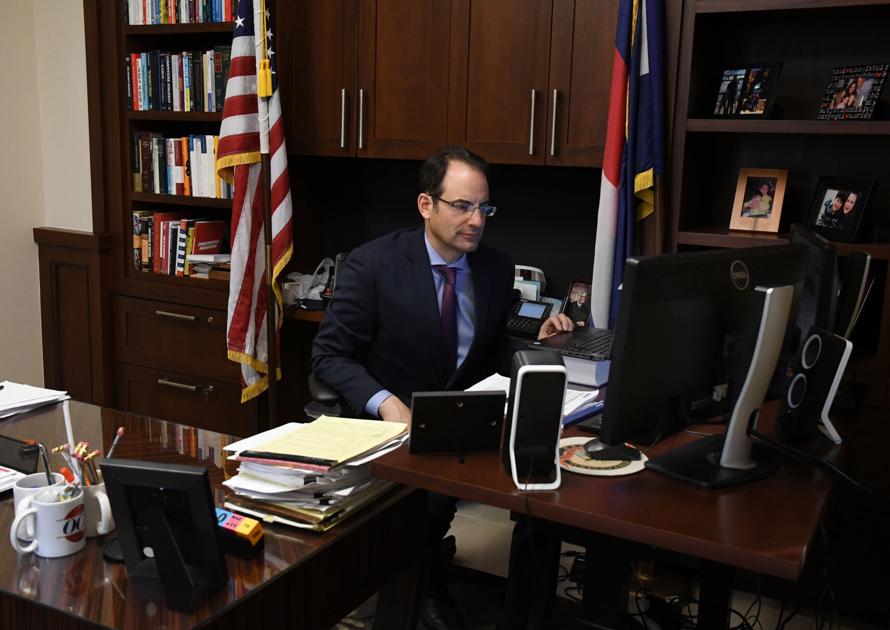As free speech comes under attack, Colorado Attorney General Phil Weiser plans to save it.
When social media services emerged on the scene, they glorified and leveraged free speech as protected in the First Amendment. Suddenly, thanks to computer technology and the internet, everyone had a veritable printing press. Rich and poor alike could develop large audiences and communicate with them on Classmates.com and Sixdegrees.com in the mid-1990s, and in the early 2000s on MySpace, Facebook, Twitter and more.
In the early days of the social networking gold rush, competition promised to serve all interests. People of all religious, philosophical, and political beliefs found themselves interacting with people traditionally far beyond their reach. Debates ranged from polite to derisive to vicious.
The First Amendment’s guarantee of free speech and freedom of the press had never been more alive.
In more recent years, that has changed. Social media giants, which act as a monolith of copycat policies, blatantly censor messages and users. They sometimes do so with good reason. They should not facilitate the plotting of riots, acts of terror or crimes. Too often, they simply censor users with ideas they disagree with. This would be no problem if consumers had a competitive choice of social media options. They don’t.
“The American way is to allow all companies to compete fairly and to provide consumers with the promise of new, innovative, and better products and services spurred by competition,” said Weiser, who met this week with The Gazette’s editorial board.
Weiser leads a bipartisan coalition of 48 states attorneys general in a federal lawsuit charging Facebook with establishing and protecting an illegal monopoly that violates the government’s antitrust laws.
“Facebook employs a variety of methods to impede competing services and — as Chairman, Chief Executive Officer, and controlling shareholder Mark Zuckerberg has stated — to ‘build a competitive moat’ around the company,” Weiser says. “The two most used strategies have been to acquire smaller companies and potential rivals before they could threaten Facebook’s dominance and to suffocate and squash third-party developers that Facebook invited to utilize its platform — allowing Facebook to maintain its monopoly over the social networking market.”
Weiser leads 37 of his fellow attorneys general in another lawsuit charging Google with “multipronged” anti-competitive practices designed to exclude some prospective advertisers, unfairly bolster others, and deprive consumers of information and choice.
“The states also allege that Google’s acquisition and command of vast amounts of data obtained because of consumers’ lack of choice has fortified Google’s monopolies and created new barriers to competition and consumer value,” Weiser says.
Preparation of the lawsuits, based on extensive investigations, preceded recent actions by Google, Amazon, and Apple to crush fledgling competitor Parler by kicking the service off their platforms. Parler began in 2018 as an alternative for mostly conservative social media users who felt silenced and excluded by Facebook, Twitter and various subsidiaries.
Weiser told us he and other AGs plan to investigate the shutdown of Parler, which could involve violations of antitrust laws. Parler should succeed or fail based only on its ability to compete on a basis of merit. It should not be destroyed by the conniving anti-competitive tactics of Big Social Media’s anti-consumer cabal.
A dyed-in-the-wool liberal Democrat, Weiser — former dean of the University of Colorado School of Law — distinguishes himself as remarkably pro-business, pro-consumer, and pro-free market. He worked for years as an antitrust lawyer for the Justice Department, where he argued against government policies that monopolize health care. He likewise questions federal protections of social media giants that don’t protect traditional publishers.
Weiser believes consumer choice, low prices, and innovation require a fair playing field in which businesses compete strictly on the merits of goods and services or the packaging and fair pricing of commodities. Schemes that knee-cap competitors diminish freedoms essential to free markets. When it comes to information services, anti-competition crimes undermine the free exchange of information that is vital to maintaining a free and prosperous society.
“If the First Amendment means anything, it means that the best response to disfavored speech on matters of public concern is more speech, not less,” said a recent ruling by the U.S. Court of Appeals for the Second District.
More speech means more social media platforms that appeal to a wide array of audiences with diverse views and communication preferences. It means a high-tech industry that facilitates and tolerates ideas deemed secular, religious, anti-religious, patriotic, unpatriotic, right, left, center, and more.
Weiser, who humbly declares himself “the people’s lawyer,” wants more free speech, not less. That means more robust and fair competition — an essential free-market component protected by the law.
Gazette Editorial Board
This content was originally published here.
